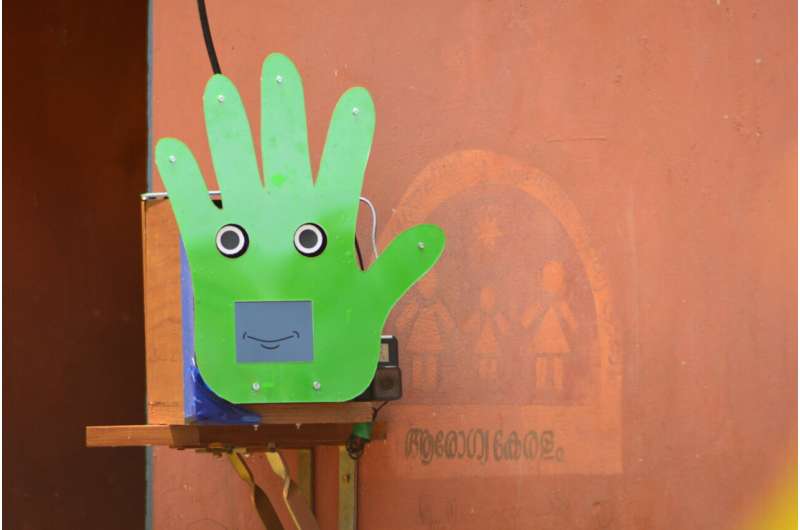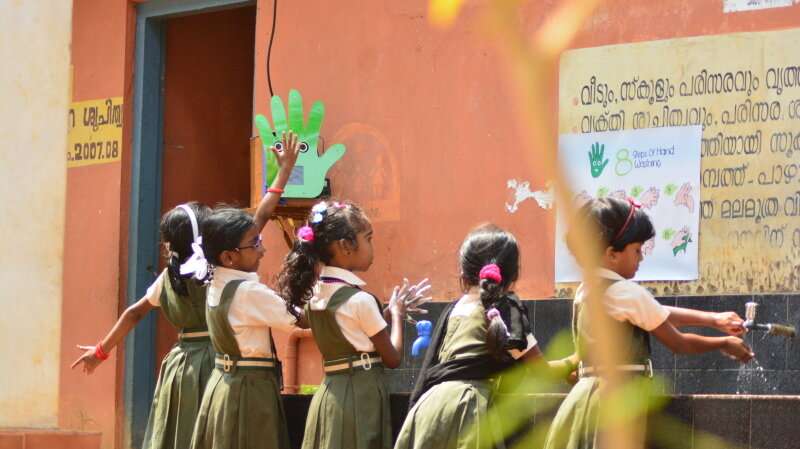Handwashing robot helps schoolkids make a clean break with bad habits

A robot which encourages kids to wash their hands has helped pupils at a remote Indian primary school take a fresh approach to hygiene.
The hand-shaped robot, dubbed "Pepe," is the product of a collaboration between researchers from the University of Glasgow in Scotland and Amrita Vishwa Vidyapeetham University in India.
Pepe was mounted to the wall above a handwashing station at the Wayanad Government Primary School in Kerala, which has around 100 pupils aged between five and 10. A small video screen mounted behind Pepe's green plastic exterior acted as a "mouth," allowing researchers to tele-operate the robot to speak to the pupils and draw their attention to a poster outlining the steps of effective handwashing. A set of moving "eyes" helped bolster the illusion that Pepe was paying attention to the childrens' actions.
The robot helped pupils to wash their hands more effectively and more consistently, boosting their rates of handwashing by 40 percent. Pupils spent on average twice as long washing their hands after Pepe's arrival. After the intervention, more than 95 percent of the students could correctly determine when handwashing with soap has to be done—before a meal and after a visit to the toilet.
The outcomes from the research project are being presented on Global Handwashing Day (Tuesday October 15) at the 28TH IEEE International Conference on Robot and Human Interactive Communication in New Delhi in India.
Hand-washing is one of the most effective defenses against the spread of diarrhea and respiratory infections, which cause the deaths of around 1,300 young children each day around the world—320 of which are in India alone, according to figures from WaterAid India and the World Health Organisation.
Dr. Amol Deshmukh, from the University of Glasgow's School of Computing Science, led the project in partnership with colleagues from Amrita University.

Dr. Deshmukh said: "We chose this particular primary school for our research because the pupils are drawn from scheduled castes and tribes, a segment of the Indian population which is most affected by poor sanitation and hygiene. We believe this is the first social robotics study to try to improve the lives of children like this.
"We were delighted by the success of Pepe's visit to this primary school. None of the children had ever interacted with anything like a robot before, but they were excited to interact with this relatively simple machine, which clearly had a positive effect on their efforts to keep their hands clean.
"Social robots could potentially create a positive impact in their lives, but they have rarely been tested with people from rural backgrounds in developing countries. This research helps in identifying a valuable and viable use case for social robots in rural populations in developing countries.
"In the future the research will focus on developing autonomous technology for the social robot, so it is capable of interacting with children without any input from humans. We're also keen to begin to carry out wide scale deployments in rural schools to measure effectiveness of this type of social robotics."
The study also followed up with a questionnaire completed by 45 of the pupils who interacted with Pepe.
- More than 90 percent of the students liked the robot and said they would like to see "Pepe" again after school vacation.
- 67 percent of the respondents thought the robot was male, while 33 percent thought it was female mostly attributing to the robot's voice as the reason.
- 60 percent said it was younger than them, feeling Pepe was like a younger brother or sister, while 33 percent thought it was older, and 7 percent perceived the robot to be of the same age
- 72 percent of the students thought Pepe was alive, largely due to its ability to talk
Dr. Rao R. Bhavani from Amrita University said: "AMMACHI (Amrita Multi Modal Applications and Computer Human Interaction) Labs have taken multiple initiatives to address common challenges facing low-income rural communities in India and worldwide using technology."
The project is the second social robot research project conducted by the University of Glasgow and Amrita University. Last year, they introduced a four wheeled robot to help residents of Ayyampathy in southern India carry 20-liter bottles of water from the local well to their homes.
More information: ro-man2019.org/



















